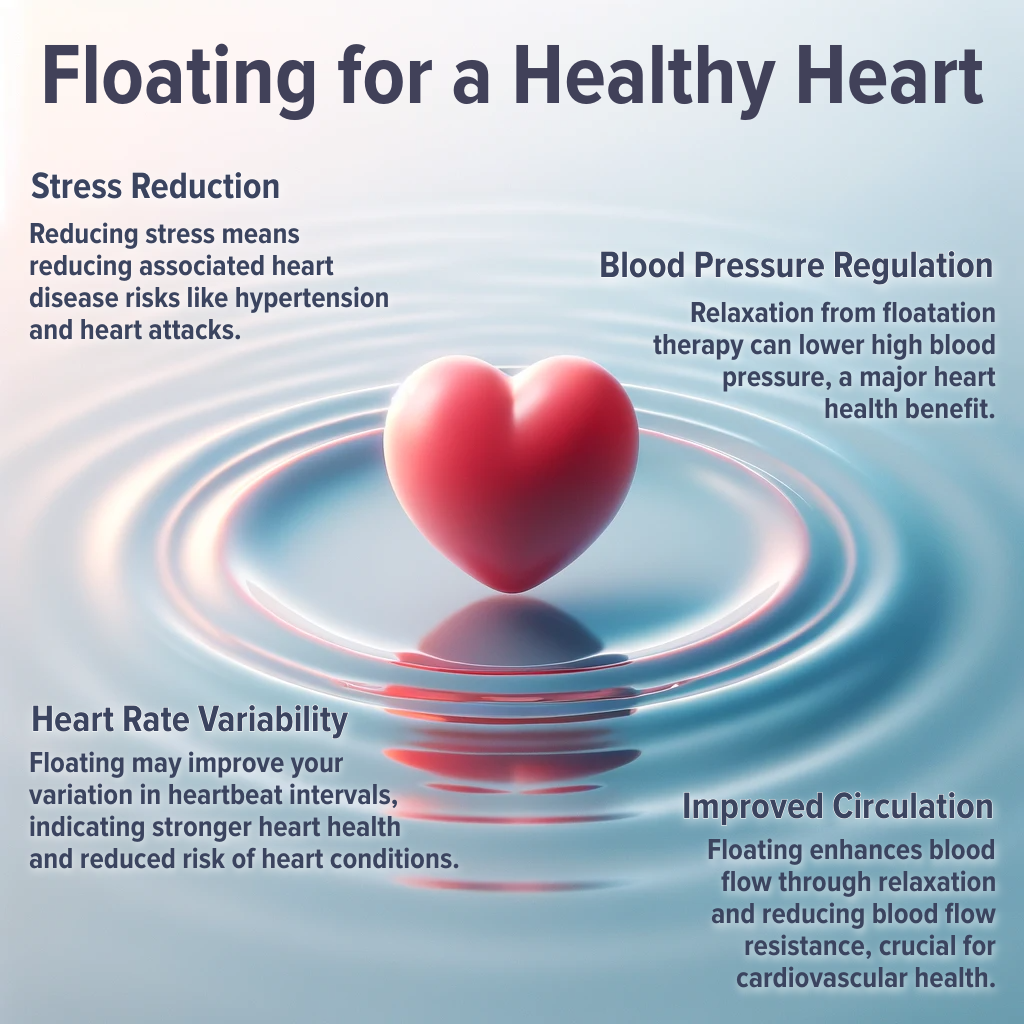
February is American Heart Month, where the spotlight turns to nurturing one of our body’s most vital organs. For those familiar with the tranquility of floatation therapy, it’s well-known as a sanctuary for the mind and body. However, its impact stretches beyond mere relaxation, touching the very core of our cardiovascular health. Let’s explore the ways in which regular floating sessions can be a powerful ally for your heart.
Easing the Heart’s Burden: Stress Reduction
In the fast-paced rhythm of modern life, chronic stress has become a public health enemy, contributing to a plethora of cardiovascular issues, including hypertension and heart attacks. The serene embrace of the float tank is a proven antidote to the stresses of daily life. For our hearts, this reduction in stress is not just a relief, but a necessity. Chronic stress taxes the heart, elevating the risk of these common heart issues. By stepping into the float tank, we allow our bodies to shift away from stress, thereby safeguarding our hearts against these risks. During this month of heart health awareness, it’s a poignant reminder of how essential stress management is for cardiovascular well-being.
Blood Pressure Regulation: Floating Toward Equilibrium
High blood pressure is a silent threat that significantly increases the risk of heart disease. The serene environment of a floatation tank can help the body shift from its sympathetic (stress-induced) state to a parasympathetic state, which is responsible for relaxation and healing. This gentle regulation is a testament to the body’s innate ability to heal and find balance, providing a non-pharmacological option to support heart health. Regular floatation therapy sessions could, therefore, play a role in maintaining optimal blood pressure levels, offering a serene route to heart health maintenance.
Improved Circulation: Nurturing Your Heart through Enhanced Flow
The benefits of floating extend to enhancing blood circulation, a key component of heart health. Good blood circulation is fundamental to cardiovascular health, ensuring that oxygen and nutrients are efficiently delivered throughout the body. The buoyancy and warmth of the saltwater in float tanks encourage the blood vessels to dilate, improving overall circulation. This enhanced blood flow can help in preventing the build-up of plaque in arteries, a major cause of heart disease.
The Heart’s Rhythm and Variability
Heart rate variability (HRV) is a measure of the variation in time between each heartbeat, considered an indicator of cardiovascular fitness and stress resilience. HRV is an important indicator of heart health, reflecting the heart’s ability to adapt to stress and changes in the environment. Emerging evidence suggests that floating may positively influence HRV, signifying a more resilient and flexible cardiovascular system. By incorporating floatation therapy into our wellness routines, we can potentially foster a heart that’s not only stronger but more adaptable to the challenges it faces.
Embracing Heart Health Through Floating
For those of us who have experienced the profound calmness of floating, it’s clear that its benefits ripple through every aspect of our well-being, including our heart health. As American Heart Month encourages us to focus on cardiovascular care, let’s recognize floatation therapy as more than just a mental escape – it’s a practice with the power to enhance heart health, offering a peaceful yet potent way to support our cardiovascular system. Whether you’re a regular floater or occasionally indulge, the heart health benefits of floating are compelling reasons to make it a staple in your self-care repertoire.
So this Heart Month we raise our glasses (and lower our blood pressure) to floating, where heart health meets profound relaxation.
